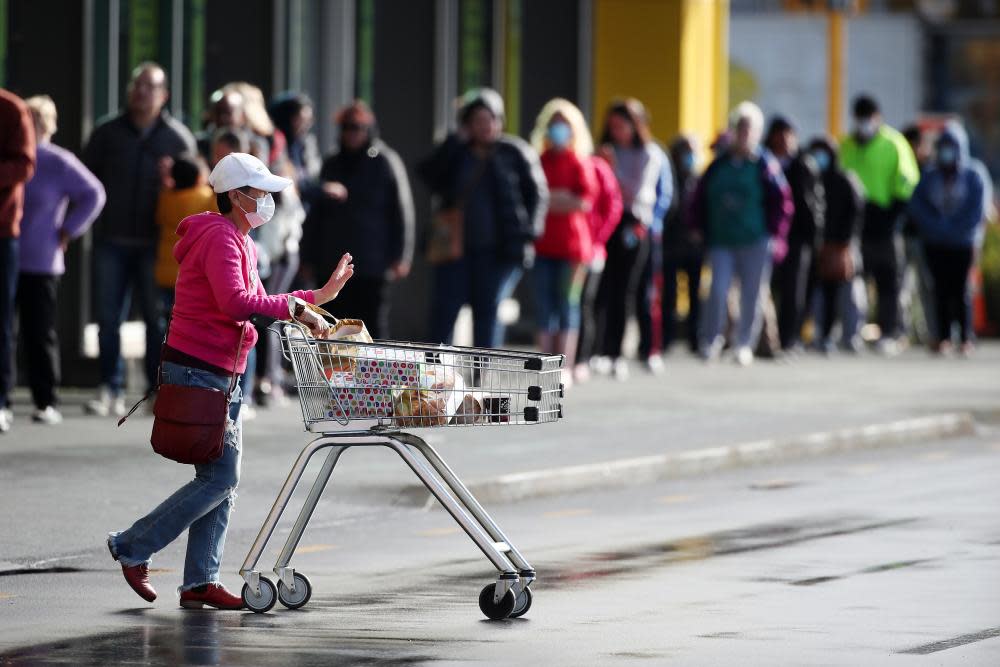'We did the right thing': sadness and uncertainty in Auckland as Covid returns

It was the storm before the calm.
In the hours immediately before Auckland went into level 3 lockdown at noon on Wednesday, the city’s roads were full, queues snaked outside supermarkets and toilet paper flew off the shelves once more.
People hurried to stock up and carry out last-minute tasks in the knowledge that the luck for one of the very few countries that appeared to have contained coronavirus had changed.
Mary Robson, 77, said having to remain indoors again was sad “but it’s a wise decision. I will do that but I’m old-school – born during the war years”.
Related: New Zealand records first new local Covid-19 cases in 102 days
The Guardian met her just after she lost her bank card. Robson handed a fish merchant $5 – all the cash she had with her – only to be given a bag of fillets and her money back.
“Kiwi spirit,” said Robson, a widow of 45 years, “I love it.”
She was shopping at Manukau City, the commercial hub of south Auckland, home to four people from the same family whose positive tests for Covid-19 prompted the new stage 3 lockdown.
Among other shoppers, brothers Des and Dave Wilson wore masks that Dave said were made from “rags out of the bin” because he hadn’t had the chance to buy any. Going into lockdown again was a shock but had to be done, said Dave. “It was going to happen.”
“And,” added his brother, “by the sound of it, there’s going to be a lot more than four cases.”
News of four positive cases of community transmission – with no known recent overseas travel or contact with anyone in a quarantine facility – comes after 102 days without a fresh local case.
Complicating the situation, two of the family to test positive work in other parts of Auckland, at companies with 130 and 160 employees, and a third visited Rotorua last weekend, where she visited family and tourist attractions.
The mood in Auckland was more resignation than outrage, although a few of more than a dozen people who spoke to the Guardian said New Zealand should have had locked the border without exception – hard luck for returning Kiwis and those wanting to come for compassionate reasons such as funerals.
Jacqueline Pickering had told two of her children to stay put in Perth, Australia rather than return home because she thought that was safest for all.
“That was hard but we did it. We did our bit, so I’m a bit annoyed. Why did they open the borders in the first place? It was under control. They come back and they don’t [all] stay in isolation.
“We did the right thing and stayed in lockdown last time. We spoke to neighbours by yelling across the street. Now this.”
Pickering said these new circumstances would be particularly hard for people who suffer anxiety and depression.
Also in South Auckland, Debbie James said it was upsetting after the country had done so well. “It’s the uncertainty of it. I feel a bit more anxious.
Related: 'A matter of when not if': New Zealand begins battle against 'Covid fatigue'
“There will be a lot of families that are going to find it really hard financially going into lockdown a second time. There will be depression and family violence. These are things that are affected by something like this.”
Most expect the new lockdown (New Zealand locked down from March to early June) will be more than the three days initially indicated.
“I’m not shocked but I am sad, given what we had,” said Peti Lamoni, a welder, who was doing his shopping across the city in Mt Albert where a child from the infected family reportedly goes to school.
Lamoni, who wore a mask provided by his employer, thought the government had done an excellent job. “Look at our neighbours, Australia, look around the world. It’s not easy.”
In nearby Mt Eden, shopper Joanna Mitchell said there was a sense of solidarity in the supermarket, where most shoppers were wearing masks.
“There was a feeling of being in this together,” she said.
Mitchell was there buying food supplies, but was staying away from some staple grocery items. “We’re actually quite low on toilet paper but I couldn’t face being seen buying any so we will just have to survive with what we’ve got.”

 Yahoo News
Yahoo News 
